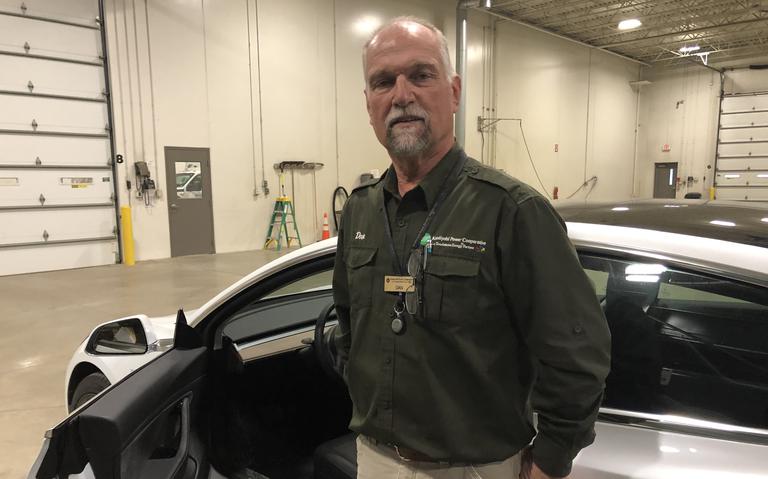SPICER—It may seem logical that a business that sells electricity should have a vehicle that runs on electricity.
That’s one reason why the Kandiyohi Power Cooperative began leasing a 2019 Tesla Model 3 this fall.
The co-op didn’t want to just “talk the talk but walk the walk,” said Dan Tepfer, energy management specialist with the co-op.
The white, four-door sedan has wrap-around advertising letting people know the car is powered “100%” by electricity.
With the rise in popularity of electric vehicles, Tepfer said the co-op decided that having one could be beneficial.
“The Kandiyohi Power Coop decided the electric vehicle future was something they wanted to promote,” he said.
After looking at different types of vehicles, Tepfer said, leasing the Tesla turned out to be the most economical option. The three-year lease began in September.
“It’s used as a promotional item to bring awareness to the electric vehicle presence in the community and the opportunity to use an electric vehicle,” he said.
It’s also an educational tool that will help the co-op discover the “practical, real-world answers to questions” that can be shared with co-op members who may be interested in owning their own electric vehicle.
The co-op staff have used the Tesla to drive to meetings and other co-op events, including a trip to Duluth that necessitated the use of a phone app that lists the locations of electric fueling stations.
The car has a 100-kilowatt battery that Tepfer said can “theoretically” go 300 miles. The co-op’s experience driving to Duluth proved otherwise, he said, with a laugh.
There are different types of refueling options, including plugging into a basic household outlet, which he said can take many hours to fully charge a battery.
Commercial stations that have “DC fast chargers” can take about 20 minutes, he said.
“There are a lot of fueling stations, but there’s a wide variety in those stations,” he said. “It’s all part of the learning process, managing your mode of transportation.”
While he doesn’t think electric vehicles will “take over everything,” Tepfer said “they have a place in fulfilling at least a section of the transportation industry” and the co-op wants to be educated about it and provide opportunities for its co-op members to learn about it as well.
He said members are invited to come to the co-op to take a ride and ask questions.
West Central Tribune by Carolyn Lange


